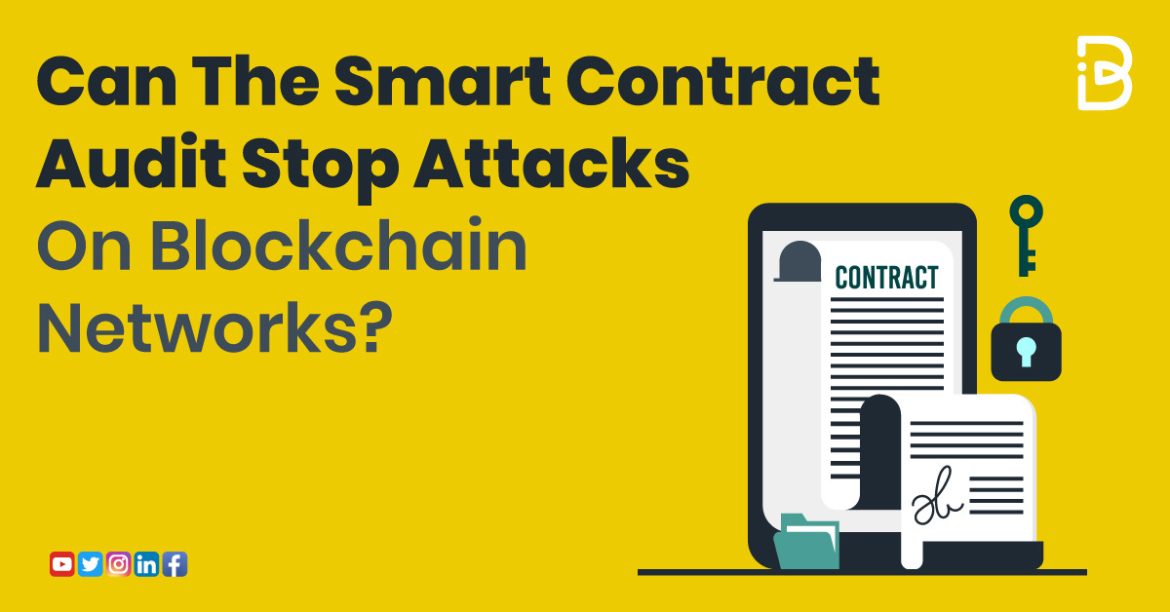Smart contracts are applications that operate on the blockchain network when specific requirements are met. They are the foundation of the blockchain industry, especially given its constantly expanding domain usage. But given how quickly Blockchain applications are being developed, vulnerabilities are almost probably inevitable.
Ensuring a bug-free deployment of smart contracts on the blockchain network necessitates a code audit. In reality, your blockchain security may be weakest when it comes to unaudited smart contracts.
Here, we’ll talk about whether auditing smart contracts can shield blockchain networks from attacks and whether there are any additional security safeguards to auditing.
Let’s start by discussing the problems with smart contracts.
Issues that could arise with smart contracts
Smart contracts, in contrast to most other agreements, are mostly focused on monetary assets. Because of the immutability of the Blockchain, mistakes in smart contracts cannot be fixed once they have been implemented.
Security vulnerabilities in smart contracts might make them a prime target for malevolent attackers.
- Fallback handling and indirect execution.
- A smart contract’s fallback feature enables indirect execution. There are numerous motives to use this feature, including:
- The fallback function is executed if a typo exists in the signature string given for encoding or if a function with that signature doesn’t exist.
- The created call starts a fallback function and sends the user’s ether to another contract.
- Gas Optimization
A gas cost is incurred for each transaction involving a smart contract.
One can be certain that gas is used in the best possible way through a smart contract audit, avoiding overutilization in any case.
- Re-entrancy, front running, poor access control, and other flaws.
Smart contract vulnerability exploration is not new. Cryptocurrency worth billions of dollars has already been stolen by hackers. In fact, some of them, like the DAO breach, prompted forking on the blockchain network.
Additional Resource: Re-entrancy attack all you need to know
- Virtual machine issues
Comparable to a blockchain processor is a virtual machine. It aims to improve the environment for smart contract execution. By separating the network and converting it into a single system that is capable of carrying out a variety of computational tasks, virtual machines do this. Similar to smart contracts, virtual machines (VMs) are susceptible to attacks including distributed denial of service (DDoS), broken access control, crypto loss when sending to an orphaned address, and more.
How does a smart contract audit shield blockchain networks against attacks?
Due to security flaws, smart contracts can be hacked and the associated crypto assets lost. It is crucial to treat their security carefully as a result. Therefore, a security audit is necessary to give your blockchain project a safety net.
Utilizing a third party to check for vulnerabilities adds a new layer to the business
- Vulnerability assessment
The code is rigorously examined by a cybersecurity auditor, who also optimizes efficiency and looks for flaws.
- Code optimization
The performance of the code is improved by auditing smart contracts in addition to finding problems. Gas optimization, often known as testing each code function for expected behavior, is also a part of this process.
- Preventing costly hacks
Hacks of smart contracts, particularly in the DeFi industry and on cross-chain bridges, have been a significant concern that has impeded blockchain adoption. As multiple recent hacks, including as the poly network assault, Acala hack, wormhole attack, and others have shown, taking advantage of weaknesses in these contracts can lead to massive losses for the platform and its users.
What else is there to blockchain security beyond smart contract audit?
Undoubtedly, the first step to ensuring blockchain security is auditing smart contracts. But it is not the only action needed to ensure the security of the project.
Firstly, smart contracts are one part of your blockchain project. It is equally vital to take care of the security aspects of other parts, including the user interface.
Secondly, an audit is the initial phase of smart contract safety. Bug bounty and smart contract insurance are the other stages of blockchain security.
Conclusion
The popularity of smart contracts is growing, but so are the vulnerabilities that are rattling the blockchain networks. indicating the necessity of putting the right code in place on the Blockchain.
Therefore, conducting a blockchain security audit is a necessary and unavoidable step in launching projects on the mainnet. It optimizes how well the smart contract works by checking the entire code for flaws.
Additional Resource: How To Add Cardano Network to Metamask

